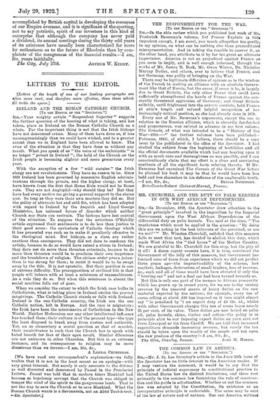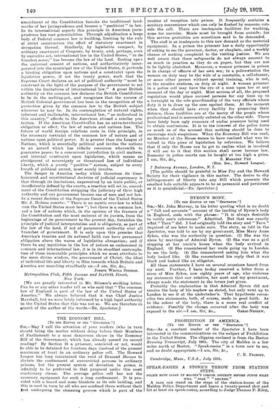THE COMMON LAW IN AMERICA.
[TO THE EDITOR OF THE " SPECTATOR.")
Sra,—Mr. J. St. Loa Strachey's article in the June 25th issue of the Spectator has no little interest to the American reader. If I may venture the comment, it would be to say that the principle of judicial supremacy in constitutional practice in the United States has its distinct limitations, and these rest primarily in the common law furnishing the rule of construc- tion and the guide in adjudication. Whether or not the common law was adopted by the Constitution, its existence as an interpretative principle is undeniable. The same may be said of the law of nature and of nations. Nor can America without amendment of the Constitution forsake the traditional land- marks of her jurisprudence and become a "positivist" in law. In its international aspects this principle in American juris- prudence has vast potentialities. Through adjudication a large body of Federal common law is building, limiting by the rule of strict construction the effect of statutory enactment in derogation thereof. Similarly, by legislative compact, by ordinary enactment of Congress, by treaty, and, perhaps, even by executive act, international law in the United States, " in its broadest sense," has become the law of the land. Resting upon the universal consent of nations, and authoritatively incor- porated into the municipal law of the United States, it portends a binding obligation upon nations and a constraint upon the legislative power, if not the treaty power, such that the Supreme Court declares an act of political authority "must be construed in the light of the purpose of the government to act within the limitations of international law." A great British authority on the common law declares the British Constitution to be in the melting-pot, and recognizes that the success of British Colonial government has been in the recognition of the protection given by the common law to the British subject wherever he may be. In its contemplation of natural rights, inherent and inalienable, international law, " as understood in this country," affords to the American abroad a similar pro- tection. If the American Constitution has no extra-territorial obligation or effect, the law of nature and nations has. The future of world foreign relations rests in this principle, in the necessary restraint of the common law of nature and of nations upon political power. It is greater than the League of Nations, which is essentially political and invites the nations to an accord -which has infinite resources wherewith to guarantee peace; to a concurrent jurisdiction in civil matters, and internal constraint upon legislation, which means no abridgment of sovereignty or threatened loss of individual liberty, which a purely "positive " system, subject to every breath of political unrest, must surely involve.
The danger in America to-day which threatens its time- honoured and constitutional doctrine of judicial, supremacy is that through its limitations, unperceived by an irate public, or insufficiently defined by the courts, a reaction will set in, amend- ment of the Constitution stripping the judiciary of their high authority and our government become one of men and not law. In a recent decision of the Supreme Court of the United States Sir. J. Holmes asserts : " There is no mystic over-law to which sven the United States must bow "; but there is a common law, and a law of nations which, in the opinion of the framers of the Constitution and the most eminent of its jurists, from the beginnings of its government to the present day, furnishes the principle of judicial interpretation and is obligatory, as part of the law of the land, if not of paramount authority over all branches of government. It is only upon this premise that America's treaties and its national faith can have permanent obligation above the waves of legislative abrogation; and iT there be any mysticism in the law of nature as embosomed in common and international law, it is in its steadfast contempla- tion of those immutable principles which we must attribute to the more divine wisdom, the government of Christ, the ideal cf individual life and liberty in Him towards which Britain and 4-merica are marching steadfastly on.—I am, Sir, &c.,
JOSEPH WHITLA STINSON. Metropolitan Club, Fifth Avenue and Sixtieth Street,
New York.
[We are greatly interested in Mr. Stinson's striking letter. Can he or any other reader tell us who said that " The common law of England is part of the law of the United States of America." We always believed that it was Chief Justice Marshall, but we were lately informed by a high legal authority in the United States that this was not so. We are therefore in search of the author of the words.—En. Spectator.]



































 Previous page
Previous page